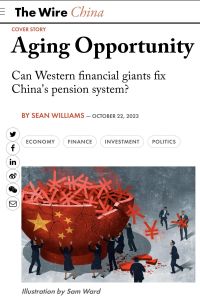
Aging Opportunity
Can Western financial giants fix China's pension system?
Recommendation
When Chinese officials implemented the nation’s one-child policy in 1979, they failed to plan for the fiscal tornado it would unleash on the long-term health of the nation’s pension system. A destructive aspect is the “1-2-4 conundrum”: One worker having to financially support two parents and four grandparents. Journalist Sean Williams explores the Chinese pension architecture, its social ramifications, and the history, current state and future trajectory of Western financial involvement. Investors, business executives and financial professionals will find this an insightful analysis.
Summary
About the Author
Reporter and photographer Sean Williams’s work has appeared in The New Yorker, Harper’s Magazine, GQ, The Daily Beast, The New Republic, Wired and The Economist.
















Comment on this summary